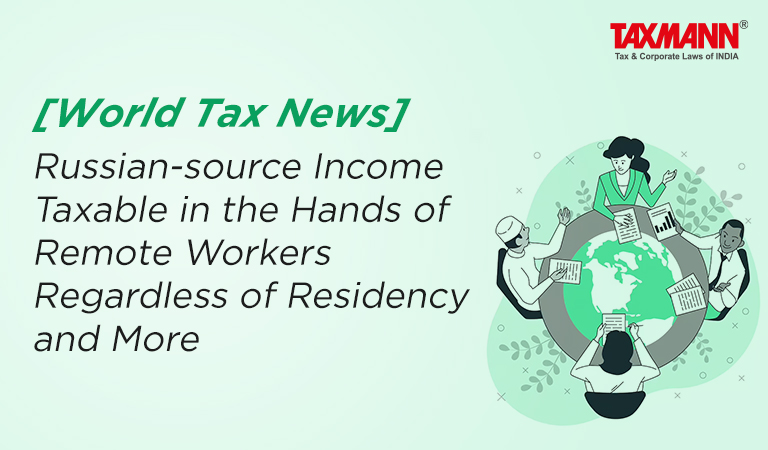[World Tax News] Russian-source Income Taxable in the Hands of Remote Workers Regardless of Residency and More
- Blog|International Tax|
- 3 Min Read
- By Taxmann
- |
- Last Updated on 14 January, 2025

Editorial Team – [2023] 152 taxmann.com 675 (Article)
World Tax News provides a weekly snippet of tax news from around the globe. Here is a glimpse of the tax happening in the world this week.
1. Russian-source income taxable in the hands of remote workers regardless of residency; Russia approves draft Bill
The Russian parliament approved a Draft Bill outlining the implementation of new taxation rules for remote workers, irrespective of their tax residency.
The Bill includes amendments to Article 208 of the Russian Tax Code, stating that remuneration received by remote workers, under an agreement with a Russian employer, will be considered taxable Russian-source income, thereby subject to individual income tax. This applies even when the employer is a Russian legal entity or a branch of a non-resident legal entity registered in Russia.
The employer will be responsible for withholding the tax at the standard rates of 13% on income up to RUB 5 million and 15% on any amount exceeding that.
These rules are effective from 1 January 2024. Furthermore, starting from 1 January 2025, the withholding rules will be extended to freelancers, contingent upon certain conditions being met.
Reference: Draft Bill No. 369931-8
2. South Africa releases Guidance Note requiring Beneficial Ownership information
The Companies and Intellectual Property Commission (CIPC) of South Africa has released Guidance Note 2 of 2023, outlining the guidelines for filing beneficial owner information.
Entities incorporated on or after 24 May 2023 must submit the records of their beneficial owners within 10 days after incorporation. Entities incorporated before this date are required to include their beneficial owner information as part of their annual return filing process starting from 24 May 2023.
The beneficial owner in respect of legal persons is defined as follows:
‘Beneficial Owner’, in respect of a company, means an individual who, directly or indirectly, ultimately owns that company or exercises effective control of that company, including through:
(a) the holding of beneficial interests in the securities of that company;
(b) the exercise of, or control of the exercise of the voting rights associated with securities of that company;
(c) the exercise of, or control of the exercise of the right to appoint or remove members of the Board of directors of that company;
(d) the holding of beneficial interests in the securities, or the ability to exercise control, including through a chain of ownership or control, of a holding company of that company;
(e) the ability to exercise control, including through a chain of ownership or control, of:
-
- A juristic person other than a holding company of that company;
- A body of persons, corporated or unincorporated;
- A person acting on behalf of a partnership;
- A person acting in pursuance of the provisions of a trust agreement; or
(f) the ability to otherwise materially influence the management of that company.
The threshold of 5% of ownership and/or control will be applicable to all entities required to file Beneficial Ownership Information.
Reference: Guidance Note 2 of 2023
3. Australia invites Public consultation on new Tax Residency rules
The Australian Treasury has initiated a public consultation regarding modernising individual tax residency rules. All interested parties are encouraged to participate, and the deadline for submitting comments is set for 22 September 2023.
The Government is consulting on a new, modernised individual tax residency framework based on recommendations made by the Board of Taxation in its 2019 report, Individual Tax Residency Rules – a model for modernisation. This measure was announced by the former Government in the 2021 22 Budget.
Under the Board’s proposed model, the primary test will be a simple ‘bright line’ test — a person who is physically present in Australia for 183 days or more in any income year will be an Australian tax resident. Individuals who do not meet the primary test will be subject to secondary tests that depend on a combination of physical presence and measurable, objective criteria.
The objective of the consultation process is to inform the development of robust principles that will underpin an enduring framework and achieve the policy intent. The consultation outcomes will help inform the Government’s decision on whether to proceed with this measure.
Reference: Administrative Guidance
Disclaimer: The content/information published on the website is only for general information of the user and shall not be construed as legal advice. While the Taxmann has exercised reasonable efforts to ensure the veracity of information/content published, Taxmann shall be under no liability in any manner whatsoever for incorrect information, if any.

Taxmann Publications has a dedicated in-house Research & Editorial Team. This team consists of a team of Chartered Accountants, Company Secretaries, and Lawyers. This team works under the guidance and supervision of editor-in-chief Mr Rakesh Bhargava.
The Research and Editorial Team is responsible for developing reliable and accurate content for the readers. The team follows the six-sigma approach to achieve the benchmark of zero error in its publications and research platforms. The team ensures that the following publication guidelines are thoroughly followed while developing the content:
- The statutory material is obtained only from the authorized and reliable sources
- All the latest developments in the judicial and legislative fields are covered
- Prepare the analytical write-ups on current, controversial, and important issues to help the readers to understand the concept and its implications
- Every content published by Taxmann is complete, accurate and lucid
- All evidence-based statements are supported with proper reference to Section, Circular No., Notification No. or citations
- The golden rules of grammar, style and consistency are thoroughly followed
- Font and size that’s easy to read and remain consistent across all imprint and digital publications are applied



 CA | CS | CMA
CA | CS | CMA
